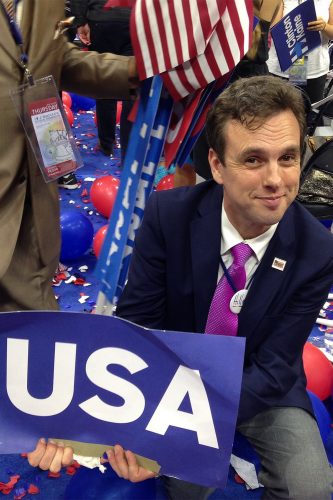
Matt Keating introduced Bernie Sanders using a Hamlet-inspired Shakespearean soliloquy during the senator’s presidential campaign rally in Island Park in 2016. Keating, who has backgrounds in theater, radio and broadcast television, worked on Sanders’ campaign. He also organized for Barack Obama and serves on Lane Community College’s Board of Education.
Now Keating is running for Eugene City Council. He filed in Ward 8, but he plans to move to south Eugene in November and run for the Ward 2 City Council seat long held by Betty Taylor. Wards 1, 2, 7 and 8 are up for election. When asked if she plans to seek re-election, Taylor had no comment.
In a recent interview, Keating says that if he’s elected, he’ll find creative funding to promote sustainable business, to develop housing and to give Eugene’s unhoused residents the services they need.
Keating supporters include former Oregon Secretary of State Bill Bradbury and Rep. Marty Wilde.
Keating says city government knows what it needs to do to address its most pressing issues. A December 2018 report conducted by the nonprofit Technical Assistance Collaborative lists recommendations for Eugene that would help ameliorate its homelessness, mental health and substance abuse issues. Envision Eugene, the city’s long-term development plan, provides a detailed map to growth.
We just need to carry it all out, Keating says.
“We need to find ways to fund elements of the TAC report,” he says. “We need to find ways to fund the bold Envision Eugene plan.”
Keating suggests looking at creative funding sources used by other municipalities of a similar size to Eugene. He mentions taxing Airbnb and sugary drinks as possible sources of city revenue.
One good use of that revenue would be building more housing on West 11th Avenue, he says. It’s an area that’s mainly zoned for commercial use right now. Keating thinks this zoning is antiquated and that the city should promote mixed residential and commercial buildings. He suggests building housing units on top of the many strip malls on the busy street.
“If we build up and not out, we protect our urban growth boundary,” Keating says. “I think it’s an investment that would pay off if you build up along transportation corridors.”
Keating also says he recognizes the gravity of the homelessness, mental health and substance abuse crises in Eugene.
“In 2008, I had to pick up human feces in an alleyway downtown when I volunteered on the Obama campaign,” Keating says. “It hasn’t gotten better. It’s gotten worse.”
Of the TAC report recommendations, he says that he would prioritize funding for the Crisis Assistance Helping Out On the Streets program, CAHOOTS, which Keating says is doing great work reaching out to people who need help.
“The more we can invest in programs like CAHOOTS, the better it is for the community at large, the better it is for the unhoused population and the folks suffering from mental health crises,” Keating says.
He also tells Eugene Weekly that if he’s elected, he’ll push to create more public restrooms around Eugene, for both housed and unhoused people to use.
“We’re human, Keating says. “We all have to go.”
Keating didn’t promise any more Shakespearean soliloquies in his City Council campaign, but he didn’t rule out iambic pentameter as a medium for campaign PR.
“Whether it’s prose or poetry, the issues that matter to folks are pretty clear,” he says. “That’s housing, health care, education and the environment that we live in.” ν